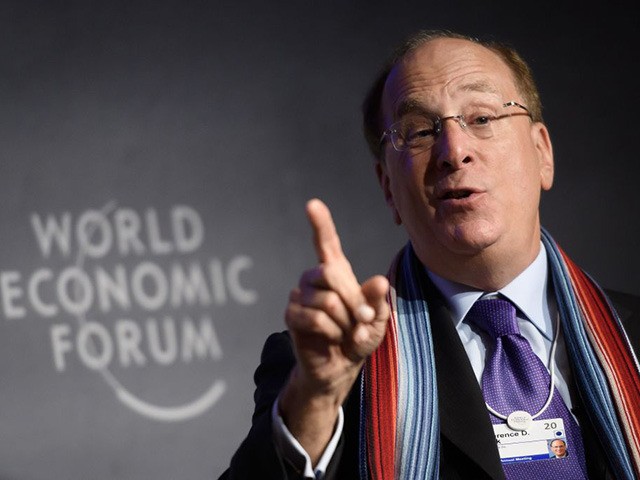Environmental zealots who want to eliminate the fossil fuels that have powered prosperity in the United States are now using infiltration tactics to make oil giants embrace alternative energy. In a historic move, Larry Fink’s BlackRock played a major role in installing two climate change activists onto ExxonMobil’s board of directors.
The corporation announced the election of its board on Wednesday:
ExxonMobil said today that based on preliminary vote estimates by its proxy solicitor, shareholders have elected eight of ExxonMobil nominees to the board of directors and two of Engine No. 1 nominees. Vote results for five nominees were too close to call.
“We welcome all of our new directors and look forward to working with them constructively and collectively on behalf of all shareholders,” said Darren Woods, chairman and chief executive officer. “We’ve been actively engaging with shareholders and received positive feedback and support, particularly for our announcements relating to low-carbon solutions and progress in efforts to reduce costs and improve earnings. We heard from shareholders today about their desire to further these efforts, and we are well positioned to respond.”
ExxonMobil has developed a portfolio of investment opportunities in high-return, low cost-of-supply projects. The company has also significantly reduced emissions and set clear plans for further reductions to 2025, consistent with the goals of the Paris Agreement.
The Blaze reported on BlackRock’s role in the infiltration:
The Hill reported that “the activist hedge fund, which has a minor stake in Exxon at just $50 million, was formed last year with the goal of shifting Exxon’s approach to climate change.” Exxon has a market value of roughly $250 billion.
But Engine No. 1 was able to gain the support of Exxon’s top shareholders in its climate change initiative, winning “the backing of the three biggest U.S. pension funds, the two biggest advisory services, and at least one of the three biggest fund managers,” The Washington Post reported. The outlet noted that those three fund managers are BlackRock, Vanguard, and State Street, who altogether “hold more than 20 percent of ExxonMobile’s shares.”
Exxon announced in a press release that preliminary vote estimates indicate that shareholders elected Engine No. 1 nominees Gregory Goff and Kaisa Hietala to the board. According to Axios, “Hietala is a a former renewables executive with the refining company Neste and Goff is the former CEO of the refiner Andeavor.”
Conservative author, talk show host and Constitutional scholar Mark Levin called the phenomenon a takeover “from within.”
The Wall Street Journal provided background on the election:
The hedge fund got a big boost from some of Exxon’s largest shareholders. BlackRock Inc. backed three of Engine No. 1’s candidates, and some of the largest U.S. pension funds also supported the activist’s slate. Asset managers are, themselves, under pressure to exert influence on their portfolio companies to do more about climate change. Many institutional investors, including BlackRock, have signed a pledge supporting goals to reach net zero carbon emissions by 2050 or sooner.
BlackRock and other asset managers have called for companies to prepare for disruptions from climate change. Critics of the world’s largest asset manager have said that BlackRock shouldn’t veer into areas that should be tackled by policy makers, but the firm’s chief executive, Larry Fink, has maintained that “climate risk is investment risk.”
BlackRock signaled earlier this year that it would be increasing its support for shareholder-led environmental, social and governance proposals, a move that could embolden other asset managers to take on companies. BlackRock said in a statement that it voted for Engine No. 1’s candidates in part because it believes Exxon and its board need to further assess the possibility that demand for fossil fuels may decline rapidly in the coming decades.
“We continue to be concerned about Exxon’s strategic direction and the anticipated impact on its long-term financial performance and competitiveness,” BlackRock said.
Fortune magazine also reported on the election, calling it a “good day for the planet”:
Climate inaction no longer seems like an option and with environmental, social, and governance (ESG) investors growing in strength and number, the pressure will likely grow.
At the current pace, global ESG assets are on track to exceed $53 trillion by 2025, over a third of the $140.5 trillion total assets under management, according analysis by Bloomberg Intelligence.
And that makes yesterday a harbinger for a cleaner future.
According to the federal Energy Information Administration (EIA), fossil fuels accounted for 80 percent of energy consumption in the United States in 2019 and continue to dominate the domestic energy market.
Follow Penny Starr on Twitter or send news tips to pstarr@breitbart.com

COMMENTS
Please let us know if you're having issues with commenting.